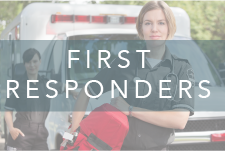Post-traumatic stress disorder, or PTSD, is a relatively common mental health condition that can develop after a person experiences or witnesses a traumatic event Symptoms can include reliving the event, avoiding reminders of the trauma, negative thoughts, and feelings, and increased emotional arousal (which might manifest as insomnia, angry outbursts, concentration difficulties, being easily startled, etc.). Veterans active duty service members and First Responders are at higher risk of developing PTSD because of their exposure to dangerous situations. If you or someone you love is struggling with PTSD, it's important to seek help from a qualified PTSD and or substance abuse treatment center.
Dual Diagnosis
There is a strong link between PTSD and substance abuse. In fact, dual diagnosis treatment centers report that up to 50% of all patients who seek treatment for addiction also have a mental health disorder.
This is not surprising when you consider the high levels of stress associated with both careers. First responders are constantly exposed to traumatic events, while veterans often return home from active duty with PTSD.
The good news is that dual diagnosis treatment can be successful. Several different modalities can be used, including CBT, EMDR, and brainspotting.
Treating both Mental Health and Substance Abuse
Group Therapy
Group therapy is a great way to provide support for people who are struggling with PTSD and substance abuse. In group therapy, participants meet in a safe and supportive environment to share their experiences and learn from each other.
The group leader will facilitate the discussion and help keep everyone on track. Group therapy can be very helpful in providing a sense of community and support.
Individual Therapy
Individual therapy is a one-on-one session with a therapist. This can be an excellent option for people who are struggling with PTSD and substance abuse. The therapist will work with the individual to develop a treatment plan that meets his or her specific needs.
The therapist will also provide support and guidance. Many people find individual therapy to be very helpful in managing their mental health and addiction.
Couples Therapy
Couples therapy is a type of therapy that is designed for couples who are struggling with PTSD and substance abuse. In couples therapy, the therapist will help the couple understand how both conditions are impacting their relationship.
The therapist will also provide tools and techniques for the couple to use in order to improve their relationship. Couples therapy can be very beneficial for couples who are struggling with PTSD and addiction.
Medication
There are a number of medications that can be used to treat both PTSD and substance abuse. This includes drugs such as antidepressants, anticonvulsants, and antipsychotics.
These medications can be very helpful in managing both conditions. It is important to work with a qualified psychiatrist to find the right medication for you or your loved one.
Recreational Therapy
Recreational therapy is a type of therapy that uses activities such as art therapy, music therapy, and hiking to help people who are struggling with PTSD and substance abuse.
These activities can be very helpful in managing symptoms of both conditions. They can also be a lot of fun!
What is an example of a Dual Diagnosis?
Let's take a look at an example of dual diagnosis. John is a veteran who has returned home from active duty with PTSD. He also struggles with alcoholism.
John's alcoholism is causing him to drink more and more in order to cope with his PTSD symptoms. This is leading to even more problems, including relationship difficulties and job loss.
John is a perfect example of someone who is struggling with dual diagnosis. He has both PTSD and alcoholism, which are impacting his life in a negative way.
Substance abuse is often a way for people to self-medicate when they are feeling stress, loss of appetite, or ruptured sleeping patterns. When someone is struggling with PTSD and substance abuse, it can be difficult to break the cycle. Dual diagnosis symptoms may include these signs: Irritability, stress, loss of appetite, ruptured sleeping patterns social withdrawal, detachment. If you are struggling with PTSD and substance abuse, it is important to seek help. Treatment can be difficult, but it is possible to overcome these challenges. There are many resources available to help you get started.
The Important of finding a treatment center that is Dual Diagnosis focused
There are a number of different dual diagnosis programs that are available, and it is important to find the one that will be the best fit for you. Some programs focus on medication management, while others offer more holistic treatments like yoga or meditation. It is important to find a program that feels safe and supportive, and that will help you to address both your mental health and your substance abuse issues.
Dual diagnosis treatment can be life-saving for those who are struggling with both PTSD and substance abuse. If you are experiencing these problems, make sure to reach out for help.
There is no shame in needing assistance, and there are many people who want to support you on your journey to recovery. Treatment can be the key to reclaiming your life and getting back to living a happy and healthy future.
If you or someone you know is struggling with PTSD and substance abuse, please reach out for help. There are many resources available, and there is no shame in seeking assistance. Dual diagnosis treatment can be the key to reclaiming your life and getting back to living a happy and healthy future.
For more information on dual diagnosis treatment - chateaurecovery.com/how-we-help




